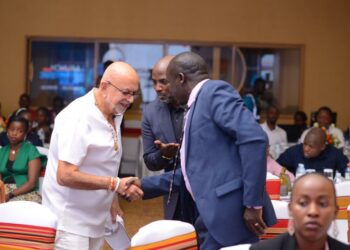By Andrew Sudmant and Andy Gouldson
Street-lighting is important. It allows informal vendors and traders to operate for longer hours and improves road and public safety. It also makes streets feel safer and more secure, especially for women.
But street-lighting is sorely lacking in many of sub-Saharan Africa’s cities, and where it is present it’s highly unreliable. In Kampala, Uganda, for example just 8% of the city’s paved road and street network is illuminated.
In cities faced with multiple pressing challenges and very limited budgets, street lighting is rarely a priority.
Even when there’s political will, there are major barriers to implementing conventional street-lighting. Many cities have large areas of informal settlements which aren’t connected to the national grid. The upfront costs of grid connectivity and street light infrastructure – like poles, lamps and pavements – are huge.
The solution may lie instead with solar lighting. We wrote a policy research paper based on work we did in two Ugandan cities, the capital Kampala and Jinja a secondary city with a population of around 80,000, and found that solar street-lighting could offer a cheaper, more sustainable solution – and bring huge benefits.
Solar street lights are cheaper to install and operate since they generate their own power, instead of drawing from the grid.
Saving money
We chose Kampala and Jinja because both cities’ governments had installed solar street lights in 2018: more than 1800 in Kampala and 92 in Jinja. We wanted to know what the lights’ impact had been since they were installed and if this could be replicated in other cities across Uganda and sub-Saharan Africa.
We analysed national policy documents and city development strategies and consulted with research colleagues at Makerere University in Kampala to identify a range of stakeholders to interview. In total, we interviewed 23 people including government officials, NGOs and members of local communities, like business owners and road users.
Across the two cities, the average cost for a solar light was around USD$1,600 per solar street light pole, compared to USD$2,150 for a conventional street light pole. In Jinja the city’s US$350,000 electricity debt led to the conventional street lights being turned off. They are still off today.
If these projects were replicated nationwide, the Ugandan government could reduce its upfront costs by 25%, electricity costs by 40% and maintenance costs by 60%.
Solar lighting also had almost no operating costs because you put the lights up and leave the sun to do the rest. Conversely, conventional lighting incur large electricity bills and higher maintenance costs because bulbs need to be replaced more frequently.
Multiple benefits
Local residents and NGO workers we spoke to identified many knock-on effects from both solar street-light projects.
In Jinja residents of a low-income settlement, where 20 solar street lights were installed, said that the lights created safer streets and allowed small businesses to stay open for an extra five hours per day. This is particularly important for low-income groups who can now make more money in the day.
The street lights have the potential to do much more.
For example, solar lights can help increase trading hours for small businesses. And thanks to savings on electricity, the cities’ governments could also redirect saved funds into the setting up of more street lights and other public services.
Rolling out
Though we found many benefits to the use of solar street-lights, there were challenges too.
First, cities in Uganda, as in many sub-Saharan Africa countries, lack the domestic expertise to plan and implement new solar lighting projects. This means municipalities have to rely on external donors for developing city plans rather than developing domestic markets which could spur national growth.
Second, though the economic case for choosing solar over conventional street lights is clear, municipalities lack the necessary capital to finance their upfront investment. There’s also a high risk that replacement lights could be unaffordable if municipal budgeting is not improved.
To overcome these challenges, national governments should create a more robust regulatory framework to grow and control domestic solar markets; building the capacity of municipal staff to plan, finance and deliver infrastructure projects; and ensure a wide range of stakeholders –- including local communities –- are involved in the planning of projects in order to maximise the social returns.
Sudmant is PhD candidate and research Fellow in the Economics of Climate Smart Cities research programme, University of Leeds while Gouldson is Professor of Environmental Policy and Associate Pro-Vice-Chancellor (Interdisciplinary Research), University of Leeds.
This article is republished from theconversation.com under Creative Commons licence.
Do you have a story in your community or an opinion to share with us: Email us at editorial@watchdoguganda.com











